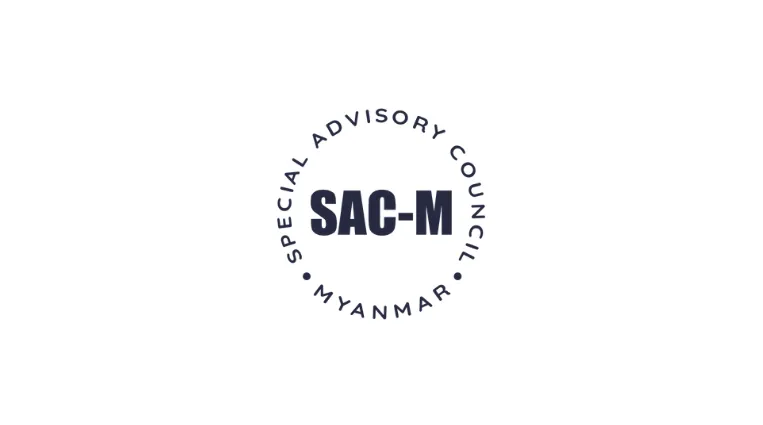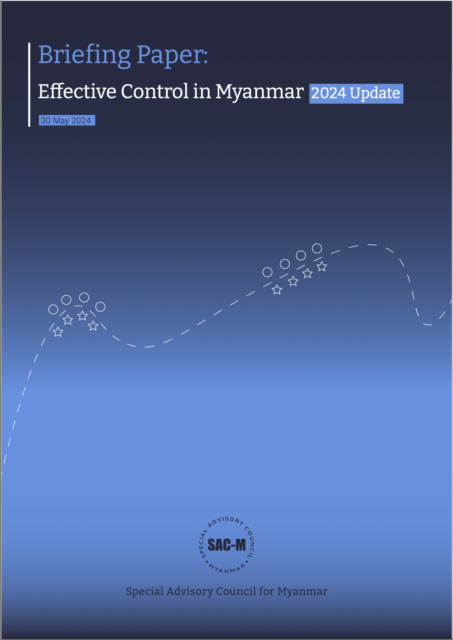Briefing Paper: Effective Control in Myanmar 2024 Update
30 May 2024


This briefing paper presents a picture of the dynamics of contestation and control across all of Myanmar more than three years since the beginning of an historic national uprising in response to the Myanmar military’s attempted coup of 1 February 2021.
SAC-M’s analysis published today, an update to its 2022 analysis on effective control, features three maps depicting illustrative visualisations indicating degrees of contestation and control across Myanmar’s varied geography. The qualitative assessments used to produce the visual models were guided by internationally accepted criteria for determining whether an entity has effective control as a de facto government of a state, derived from international case law. Those criteria include the acceptance of the population, the capacity to administer functions of government and degree of permanency, in addition to taking control of territory into account.
The breifing paper includes the following key messages:
- The overall trajectory of conflict in Myanmar since 2022 has been one of expanding resistance control versus corresponding military junta losses. That trajectory has been consistent and escalated rapidly from October 2023.
- The junta has not pacified or suppressed resistance anywhere and has not brought any township that contained defended resistance territory in 2022 under stable junta control. The junta has very limited control and access in townships on Myanmar’s international borders and is under pressure in much of central Myanmar. No city is free from regular conflict and many smaller cities and towns are fully or partially outside of junta control.
- The military junta is not a legitimate (de jure) government. It is not a de facto government either, as it does not meet the criteria for having effective control of the state. It has not demonstrated that it has the capacity to establish effective control.
- Resistance to junta control remains strong, widespread and deeply entrenched. External efforts to stabilise the junta are likely to be rejected and resistance will continue.
- A crescent of townships with increasing resistance control and containing large resistance territories now spans from Myanmar’s eastern border with China in Shan state, across Kachin state in the north, through Sagaing region and Chin state bordering India on Myanmar’s west, and south all the way to the Bay of Bengal. A smaller cluster reaches south from the eastern border with Thailand in Karenni and Karen states and almost connects with another group of townships with strong resistance control in Tanintharyi region along the Andaman Sea coast.
- The junta is by far the primary source of violence and instability and grave violations of international human rights and humanitarian law. It shows no willingness to meet the demands of the democratic revolution, only a commitment to further violence and suppression. International efforts to protect people from junta atrocities must be strengthened.
- Governance capacity is weak across the country while needs for humanitarian assistance and primary services are great and growing. International humanitarian and development assistance must be delivered in direct coordination with resistance actors who now have greater control than the junta in large tracts of the country.
The international community must respond to Myanmar’s fluid and complex crisis in a manner that accepts the dynamics on the ground and upholds obligations under international law to facilitate the clearly stated democratic aspirations of the Myanmar people. Included in SAC-M’s recommendations to States, the United Nations and ASEAN, are immediate actions that must be taken to undermine the military junta’s ability to commit atrocities and to massively scale-up provision of humanitarian assistance to people in need through direct coordination with resistance authorities and civil society. Longer-term support from the international community will be critical for resistance actors to build the capacity of government departments and services and to promote economic development in post-revolution Myanmar.
Announcements
21 May 2025
Open letter: Malaysia must lead ASEAN with principle, not hypocrisy, to address the Myanmar crisis

Progressive Voice is a participatory rights-based policy research and advocacy organization rooted in civil society, that maintains strong networks and relationships with grassroots organizations and community-based organizations throughout Myanmar. It acts as a bridge to the international community and international policymakers by amplifying voices from the ground, and advocating for a rights-based policy narrative.